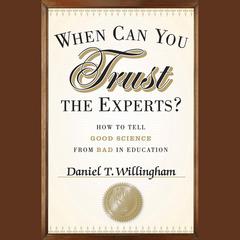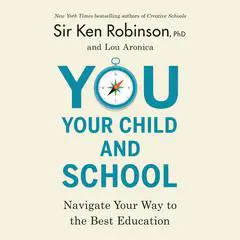 Play Audiobook Sample
Play Audiobook Sample
Why Don't Students Like School?: A Cognitive Scientist Answers Questions About How the Mind Works and What It Means for the Classroom Audiobook
 Play Audiobook Sample
Play Audiobook Sample
Quick Stats About this Audiobook
Total Audiobook Chapters:
Longest Chapter Length:
Shortest Chapter Length:
Average Chapter Length:
Audiobooks by this Author:
Publisher Description
Kids are naturally curious, but when it comes to school it seems like their minds are turned off. Why is it that they can remember the smallest details from their favorite television programs, yet miss the most obvious questions on their history test?
Cognitive scientist Dan Willingham has focused his acclaimed research on the biological and cognitive basis of learning and has a deep understanding of the daily challenges faced by classroom teachers. This book will help teachers improve their practice by explaining how they and their students think and learn—revealing the importance of story, emotion, memory, context, and routine in building knowledge and creating lasting learning experiences.
In this breakthrough book, Willingham has distilled his knowledge of cognitive science into a set of nine principles that are easy to understand and have clear applications for the classroom. Some examples of his surprising findings are:
—"Learning styles" don't exist. The processes by which different children think and learn are more similar than different.
—Intelligence is malleable. Intelligence contributes to school performance and children do differ, but intelligence can be increased through sustained hard work.
—You cannot develop "thinking skills" in the absence of facts. We encourage students to think critically, not just memorize facts. However, thinking skills depend on factual knowledge for their operation.
Why Don't Students Like School is a basic primer for every teacher who wants to know how their brains and their students' brains work and how that knowledge can help them hone their teaching skills.
Download and start listening now!
"I'm reading this for a "collegial circle" with my department at school. A very interesting insight into the way we learn, why students struggle with some of the tasks we assign and our expectations as teachers. A very thought provoking book that helps teachers think/rethink about their practices and that also gives cognitive scientific backing to why teachers do the crazy things we do sometimes (those things actually work & it's been proven :)."
— Beth (4 out of 5 stars)
Quotes
-
Corporate trainers, marketers and, not least, parents---anyone who cares about how we learn---should find his book valuable reading.
— The Wall Street Journal -
“Corporate trainers, marketers and, not least, parents—anyone who cares about how we learn—should find his book valuable reading.”
— Wall Street Journal -
“Every teacher and parent should listen two or three times to this fine production.…. Paul Costanzo’s well-paced narration brings clarity, conviction, and immediacy.…Highly recommended to students for its explanation of how to use learning time efficiently.”
— AudioFile -
“This book offers you the research, and the arguments, that will help you become a more effective teacher.”
— Joe Riener, English teacher
Why Don't Students Like School? Listener Reviews
-
" This book explains in a simple way how our brains work and why students have various challenges with school because of how the brain functions. He keeps the book interesting, divided into chapters with titles of questions that will draw your interest to learn the answers. The chapters are brief and well-written. This book should be read by everyone! "
— Carolyn, 1/15/2014 -
" Really intersting take on multiple intelligences, amongst other ideas "
— Fab, 1/9/2014 -
" Must read for educators. Parents too. "
— Lauren, 1/9/2014 -
" It gave me some ideas for helping students learn, but it is the type of book that will require a second reading to really integrate the information into my thinking. "
— Lyddie, 12/29/2013 -
" I didn't agree with everything in the book, but it gave me reason to think, deeply. Great read! "
— Lisa, 12/27/2013 -
" Exciting and interesting. Every teacher should read this. "
— Amy, 12/21/2013 -
" The book will revolutionize they way you think about learning and teaching. Based on solid research in the cognitive sciences, Willingham dispels various myths about learning while bring the reader up to date on the latest research. Highly recommended for teachers and librarians! "
— Ben, 12/9/2013 -
" should be read by all ed psych professors and special education teachers. "
— Alan, 12/5/2013 -
" Willingham uses Q and A to answer some of the issues that are age old in education. He defends some practices like memory work and debunks some like learning styles. Whether one agrees with him or not, it is a great conversation starter for any education community. "
— Ldobler, 11/10/2013 -
" Excellent book if you want to understand how (and why) your children learn and how (and why) teachers should modify their teaching style to teach YOUR child. "
— Buckeye, 11/11/2012 -
" A must-read for teachers. This is a readable account of the fundamentals of neuroscience as they apply to teaching and learning. "
— Emily, 7/21/2012 -
" interesting book with some very useful ideas. The writting style was a bit boring with a lot academic talk. Even if you're not a teacher it is still a book that's worth a read. "
— Kei, 4/13/2012 -
" The science behind all those $64,000 questions about education. Some we already know the answers to and the research just backs it up; some is defending the opposite of what "new thinking" has been telling us about how kids learn. "
— Erin, 3/26/2012 -
" This is a book I read for work but also because I was just interested in it. It's a good basic introduction to cognitive psychology. It's written primarily for K-12 teachers, but I think it has some valuable lessons for anyone who is interested in learning about how we learn. Very accessible. "
— Billie, 12/4/2011 -
" Great food for thought as to how to best engage students in the classroom. Made me question my current strategies for planning lessons and gave me a new perspective on differentiation for students. Each chapter is arranged around a theme with a "lesson" or main idea to take away. Well written. "
— Ms.Given, 10/11/2011 -
" good book; worth reading and changing some strategies for teaching "
— Linda, 9/29/2011 -
" The best book on education I have ever read. <br/> <br/>The highlight is probably the chapter where he destroys multiple intelligence pedagogy. "
— Brett, 9/3/2011 -
" <br/>Very nice book for teachers, and even students !<br/>I really enjoyed my time reading it.<br/>It states many psychological facts in a very simple way that everyone can understand.<br/><br/>It tells you how your brains work, and give you some tips to change the way you think/study.<br/> "
— Haneen, 8/29/2011 -
" should be read by all ed psych professors and special education teachers. "
— Alan, 7/30/2011 -
" A very readable peek into some of the most plaguing issues in teaching today, from the perspective of a cognitive scientist. "
— Totallynotyourenglishteacher, 6/23/2011 -
" Hands down, the best book I've ever been assigned to read as part of college/graduate coursework. Highly recommended for any educator! "
— Hershock, 5/17/2011 -
" A must-read for teachers. This is a readable account of the fundamentals of neuroscience as they apply to teaching and learning. "
— Emily, 4/10/2011 -
" I really liked parts of this text and found them relevant. However, I found some aspects to be easier said than done within the classroom. "
— Julie, 3/23/2011 -
" This is a book I read for work but also because I was just interested in it. It's a good basic introduction to cognitive psychology. It's written primarily for K-12 teachers, but I think it has some valuable lessons for anyone who is interested in learning about how we learn. Very accessible. "
— Billie, 2/24/2011
About Daniel T. Willingham
Daniel T. Willingham is a professor of psychology at the University of Virginia, where he has taught since 1992, conducting research on the applications of cognitive science to K–12 education. He earned his BA in psychology from Duke University and his PhD from Harvard University. Willingham writes the popular “Ask the Cognitive Scientist” column for American Educator magazine.
About Paul Costanzo
Paul Costanzo earned both his BA and MA from Juilliard in trumpet performance. As a freelance performer his musical credits range from the Metropolitan to the San Francisco Symphony. He has also been a voice actor for over twenty years and has performed numerous radio commercials, television promos, and narrations for major corporations nationwide. As an audiobook narrator and director, he records regularly for Brilliance Audio, Tantor Media, and Deyan Audio.


























